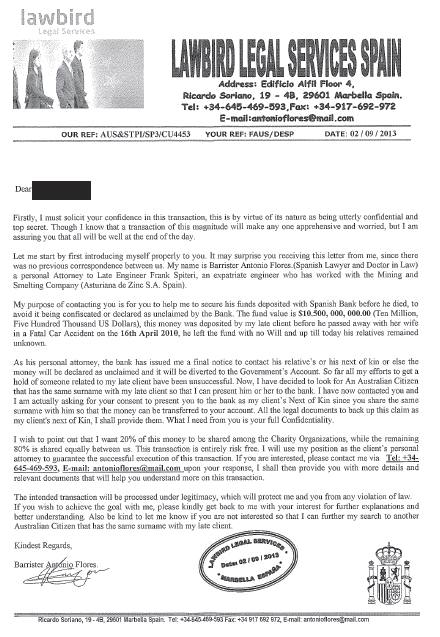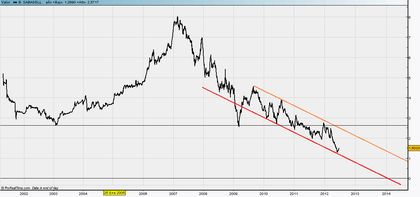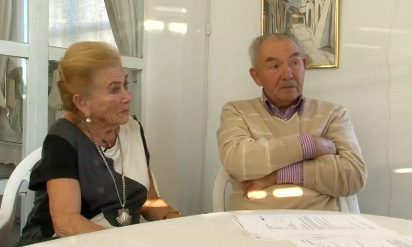Jail Terms for Dishonest Real Estate Agents
T wo Court rulings have each confirmed that real estate agents should serve a minimum of 2 years in prison for defrauding both buyers and sellers in at least two property deals. The punishment meted out to these professionals relates to the dishonest -albeit not common- habit of structuring their commission payment, in addition to what % they formally agree on with either party, on the difference between what the buyer pays and what the seller receives…without telling either party what these amounts were.
wo Court rulings have each confirmed that real estate agents should serve a minimum of 2 years in prison for defrauding both buyers and sellers in at least two property deals. The punishment meted out to these professionals relates to the dishonest -albeit not common- habit of structuring their commission payment, in addition to what % they formally agree on with either party, on the difference between what the buyer pays and what the seller receives…without telling either party what these amounts were.
The Courts, on finding the estate agents guilty on counts of criminal fraud, concluded the following:
- Both buyer and seller were unaware of the real terms of the deal, having the estate agent effectively obtained the consent of both parties on different prices to those reciprocally agreed with either party, causing loss to both.
- The dual agreements are not a reflection of the real facts, the price for the buyer and the vendor are different and the “agreed commission” is not real, as it was jacked up.
- The “buyer’s price” was not the lowest he could get away with and the “seller’s price” was not the highest the property could achieve, owing to an artificial and fabricated deal.
- The Court refutes the defense allegation that the real estate bought and then sold the property, at a profit, on grounds that it is improper conduct for real estate brokers to act in such manner, in addition to concealing the true nature of the deal to its customers.
- The Court neither accepts that both buyer and seller were satisfied at the time with the terms of the agreed transaction: they probably were as they did not know otherwise, owing to the disinformation and deception devised by the agent.
- There is an aggravating circumstance in that the real estate agents, operating via an establishment opened to the public, added further credibility to their actions and facilitated the removal of objections by buyer and seller.
Similar behaviours as those described are known to have happened in the Costa del Sol but the likelihood of them resurfacing, considering that approximately 95% of all transactions included 2 real estate agents, is mostly residual.


 According to report on the matter, banks provide 90% of the investment and financial advice given in Spain. The remaining 10% is left to the different type of authorized investment businesses: financial and investment advisors, broker-dealers, securities dealer companies and brokerage houses.
According to report on the matter, banks provide 90% of the investment and financial advice given in Spain. The remaining 10% is left to the different type of authorized investment businesses: financial and investment advisors, broker-dealers, securities dealer companies and brokerage houses.



 It is only a few days ago when we
It is only a few days ago when we  Having met with dozens of victims of the Equity Release fraudulent scheme, we asked some of them if they would be happy to be interviewed; the result was very positive, with some willing to be interviewed every week, if need be!
Having met with dozens of victims of the Equity Release fraudulent scheme, we asked some of them if they would be happy to be interviewed; the result was very positive, with some willing to be interviewed every week, if need be! 
 Last Sunday morning, while cycling around La Cala area, I spotted what looked like an isolated bored Spanish donkey with what looked like a kind of a smallish stork on its back, the latter presumably going about the job of cleansing the animal from parasites, and the former happily accepting it. This is what they call symbiosis, or a mutually beneficial relationship involving close physical contact between two organisms that aren’t the same species. I took some pictures but the mobile was not powerful, unfortunately. In a strange mental composition exercise whilst negotiating the curves, I immediately thought of more than a handful of Spanish property developers and Mr. Carlo S. Mottola, in what could be one of the biggest cases or fraud in the Spanish property sector, and the relationship they had struck to bring misery, anguish and pain to, once again, off-plan property buyers. On the one side of the fraud, sitting comfortably on top of the donkey, Mr. Mottola, the man behind the bogus Compagnie Des Garanties de Du Luxembourg S.A., Company of Guaranties Ltd. and Cauzione, flouting every mandatory insurance legislation provision and without a penny behind him, and with the Spanish Insurance watchdog DGS (Dirección General de Seguros) warning about his activities as early as 2003 (and who incidentally have done nothing since), erected himself as the provider of surety contracts worth tens of millions of pounds knowing full well he could have never honoured them, if we notice the following:
Last Sunday morning, while cycling around La Cala area, I spotted what looked like an isolated bored Spanish donkey with what looked like a kind of a smallish stork on its back, the latter presumably going about the job of cleansing the animal from parasites, and the former happily accepting it. This is what they call symbiosis, or a mutually beneficial relationship involving close physical contact between two organisms that aren’t the same species. I took some pictures but the mobile was not powerful, unfortunately. In a strange mental composition exercise whilst negotiating the curves, I immediately thought of more than a handful of Spanish property developers and Mr. Carlo S. Mottola, in what could be one of the biggest cases or fraud in the Spanish property sector, and the relationship they had struck to bring misery, anguish and pain to, once again, off-plan property buyers. On the one side of the fraud, sitting comfortably on top of the donkey, Mr. Mottola, the man behind the bogus Compagnie Des Garanties de Du Luxembourg S.A., Company of Guaranties Ltd. and Cauzione, flouting every mandatory insurance legislation provision and without a penny behind him, and with the Spanish Insurance watchdog DGS (Dirección General de Seguros) warning about his activities as early as 2003 (and who incidentally have done nothing since), erected himself as the provider of surety contracts worth tens of millions of pounds knowing full well he could have never honoured them, if we notice the following:
 And again in 2008, another payment:
And again in 2008, another payment:  And what about the American company?
And what about the American company? 